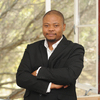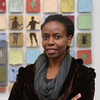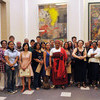Translanguaging: Facilitating multilingual teaching
17 July 2018 | Story Sarah Middleton. Photo Je’nine May. Read time 3 min.
A new emphasis on multilingualism in South African universities is gaining momentum through a translanguaging project currently under way at the University of Cape Town (UCT).
The project, led by Professor Mbulungeni Madiba at the Multilingualism Education Project (MEP) in the Centre for Higher Education Development (CHED), is aimed at bringing students’ multilingual resources into the classroom.
It was conceptualised in collaboration with the University of Birmingham in the UK in 2017, and also involves Rhodes University, the University of the Witwatersrand (Wits) and the University of Limpopo.
Explaining the project, Madiba said: “What we have been trying to do is to come up with a multilingual strategy that can be used in teaching and learning programmes where students don’t need to use only one language.”
This allows students to discuss and explore concepts in the language they feel most comfortable speaking.
“We are moving away from monolingual language policies.”
“We are moving away from monolingual language policies. For example, at UCT, we say that English is the primary medium of instruction, but what we are seeing from language practitioners is that they are not relying only on English. We need to recognise other languages.”
“They will be drawing on their home languages in learning, and they will also draw on English. That practice is what we call translanguaging.”
Translanguaging spaces
Madiba explained that the practical implications of translanguaging meant that lectures must provide a so-called “translanguaging space”, where they could draw from their own languages.
“We see tutorials as spaces where we can allow students to draw on their own languages and discover amongst themselves. They can discuss concepts in the language in which they feel confident,” he said.
It may sound complicated, but it is not necessary for lecturers and tutors to be versed in the multitude of languages that may be used in the classroom, according to Madiba.
“Discussion can happen in different languages, and reporting back can happen in English. So one language can be an input, but another language can be the output,” he said.
The project has the support of Vice-Chancellor Professor Mamokgethi Phakeng, who said: “Given the hegemony of English, the choice that our [language] policy offers is a chimera. It’s a false choice. We have very little room for manoeuvre. And that’s why we are talking about translanguaging: we are manoeuvring.”
 This work is licensed under a Creative Commons Attribution-NoDerivatives 4.0 International License.
This work is licensed under a Creative Commons Attribution-NoDerivatives 4.0 International License.
Please view the republishing articles page for more information.
Centre for Higher Education Development
In the news


.jpg)
















































































































































































































